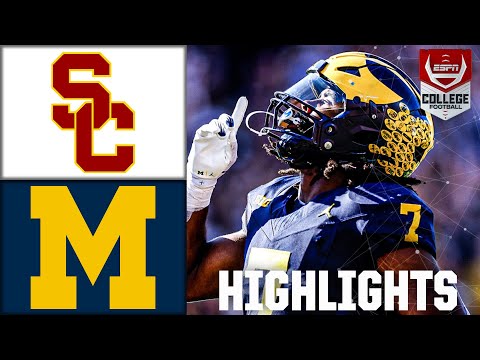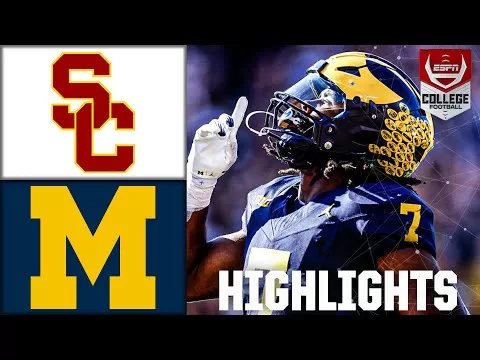USC played a team that passed for 32 yards.
Not on one play.
In the entire game.
Coach Lincoln Riley described the 27-24 loss to Michigan on Saturday as a game his team could have won, saying, “We came up one play short.”
In truth, this was a game the Trojans should have won.
This was a game in which the defending national champion Wolverines were booed in their own stadium. This was a game in which USC had the ball and a four-point lead in the last five minutes against an opponent that hadn’t scored in any of its last six drives.
In their two previous games, the Trojans played as if the days of them beating themselves were behind them, but the perception ignored a critical detail.
They were still coached by Riley.
As dynamic as his offenses can be, as much as new coordinator D’Anton Lynn has improved his once-porous defense, Riley hasn’t proven he can remain level-headed in games of this magnitude.
USC’s first Big Ten game offered another example.
Riley made some curious play calls, the most noteworthy of them on the possession that preceded Michigan’s winning drive. The Trojans went three-and-out, twice stopping the clock on incomplete shovel passes attempted by quarterback Miller Moss. The possession burned less than a minute, leaving enough time for the Wolverines to move back in front on Khalel Mullings’ one-yard run with 37 seconds remaining in the game.
“I thought I could have been better,” Riley acknowledged. “I don’t think I called a very good drive there.”

Riley was considerably less self-critical when asked about his team’s offensive philosophy to start the game, even though the Trojans were held to just three points in the first two quarters. They went into halftime trailing, 14-3.
“I felt like we had a lot of opportunities there in the first half that we missed,” Riley said. “Probably more about execution than calls.”
But USC clearly attempted to beat Michigan at its own game, stubbornly running the ball up the middle, even though the Wolverines’ defensive line included two future NFL tackles in Mason Graham and Kenneth Grant. When the Trojans weren’t running the ball, they often resorted to screen passes.
The results were disastrous.
Newsletter
Fight on! Are you a true Trojans fan?
Get our Times of Troy newsletter for USC insights, news and much more.
You may occasionally receive promotional content from the Los Angeles Times.
The Wolverines were more physical on both sides of the ball. They held the Trojans to negative rushing yardage through two quarters. They started a mobile quarterback who couldn’t throw, and who the Trojans knew wouldn’t throw, but still managed to score two touchdowns before halftime.
The Trojans emerged from the break with a game plan that more closely resembled their own. Instead of looking for the run to open up the pass, they relied on the pass to open up the run.
Moss passed for his first touchdown on the opening drive of the second half. Moss had a pass intercepted and returned for a touchdown on USC’s next drive, but he responded by passing for two more scores to move the Trojans in front 24-20.
The crowd of more than 110,000 fans turned on the home team, booing the Wolverines when their run-only offense stagnated.
The game was there for the taking. Somehow, the Trojans blew it.
In the postgame news conference, Riley elected to praise his team’s resilience rather than grieve the opportunities that were lost.
“I think it was a classic back-and-forth fight,” he said.
The approach was understandable. The Trojans still have nine games remaining on their regular-season schedule. They can still reach the College Football Playoff.
However, if USC is to become the program it envisioned when Riley was hired, it will have to figure out how to close out a game like this. Riley wasn’t brought to Los Angeles to be competitive. He was brought to win championships.
Right now, the Trojans have a championship defensive coordinator. They have a championship quarterback. They need Riley to be a championship head coach.
